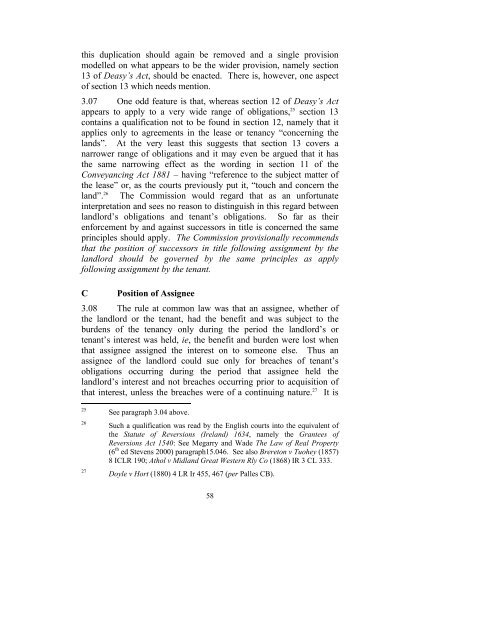Consultation Paper on the General Law of the Landlord and Tenant
Consultation Paper on the General Law of the Landlord and Tenant
Consultation Paper on the General Law of the Landlord and Tenant
You also want an ePaper? Increase the reach of your titles
YUMPU automatically turns print PDFs into web optimized ePapers that Google loves.
this duplicati<strong>on</strong> should again be removed <strong>and</strong> a single provisi<strong>on</strong>modelled <strong>on</strong> what appears to be <strong>the</strong> wider provisi<strong>on</strong>, namely secti<strong>on</strong>13 <strong>of</strong> Deasy’s Act, should be enacted. There is, however, <strong>on</strong>e aspect<strong>of</strong> secti<strong>on</strong> 13 which needs menti<strong>on</strong>.3.07 One odd feature is that, whereas secti<strong>on</strong> 12 <strong>of</strong> Deasy’s Actappears to apply to a very wide range <strong>of</strong> obligati<strong>on</strong>s, 25 secti<strong>on</strong> 13c<strong>on</strong>tains a qualificati<strong>on</strong> not to be found in secti<strong>on</strong> 12, namely that itapplies <strong>on</strong>ly to agreements in <strong>the</strong> lease or tenancy “c<strong>on</strong>cerning <strong>the</strong>l<strong>and</strong>s”. At <strong>the</strong> very least this suggests that secti<strong>on</strong> 13 covers anarrower range <strong>of</strong> obligati<strong>on</strong>s <strong>and</strong> it may even be argued that it has<strong>the</strong> same narrowing effect as <strong>the</strong> wording in secti<strong>on</strong> 11 <strong>of</strong> <strong>the</strong>C<strong>on</strong>veyancing Act 1881 – having “reference to <strong>the</strong> subject matter <strong>of</strong><strong>the</strong> lease” or, as <strong>the</strong> courts previously put it, “touch <strong>and</strong> c<strong>on</strong>cern <strong>the</strong>l<strong>and</strong>”. 26 The Commissi<strong>on</strong> would regard that as an unfortunateinterpretati<strong>on</strong> <strong>and</strong> sees no reas<strong>on</strong> to distinguish in this regard betweenl<strong>and</strong>lord’s obligati<strong>on</strong>s <strong>and</strong> tenant’s obligati<strong>on</strong>s. So far as <strong>the</strong>irenforcement by <strong>and</strong> against successors in title is c<strong>on</strong>cerned <strong>the</strong> sameprinciples should apply. The Commissi<strong>on</strong> provisi<strong>on</strong>ally recommendsthat <strong>the</strong> positi<strong>on</strong> <strong>of</strong> successors in title following assignment by <strong>the</strong>l<strong>and</strong>lord should be governed by <strong>the</strong> same principles as applyfollowing assignment by <strong>the</strong> tenant.C Positi<strong>on</strong> <strong>of</strong> Assignee3.08 The rule at comm<strong>on</strong> law was that an assignee, whe<strong>the</strong>r <strong>of</strong><strong>the</strong> l<strong>and</strong>lord or <strong>the</strong> tenant, had <strong>the</strong> benefit <strong>and</strong> was subject to <strong>the</strong>burdens <strong>of</strong> <strong>the</strong> tenancy <strong>on</strong>ly during <strong>the</strong> period <strong>the</strong> l<strong>and</strong>lord’s ortenant’s interest was held, ie, <strong>the</strong> benefit <strong>and</strong> burden were lost whenthat assignee assigned <strong>the</strong> interest <strong>on</strong> to some<strong>on</strong>e else. Thus anassignee <strong>of</strong> <strong>the</strong> l<strong>and</strong>lord could sue <strong>on</strong>ly for breaches <strong>of</strong> tenant’sobligati<strong>on</strong>s occurring during <strong>the</strong> period that assignee held <strong>the</strong>l<strong>and</strong>lord’s interest <strong>and</strong> not breaches occurring prior to acquisiti<strong>on</strong> <strong>of</strong>that interest, unless <strong>the</strong> breaches were <strong>of</strong> a c<strong>on</strong>tinuing nature. 27 It is252627See paragraph 3.04 above.Such a qualificati<strong>on</strong> was read by <strong>the</strong> English courts into <strong>the</strong> equivalent <strong>of</strong><strong>the</strong> Statute <strong>of</strong> Reversi<strong>on</strong>s (Irel<strong>and</strong>) 1634, namely <strong>the</strong> Grantees <strong>of</strong>Reversi<strong>on</strong>s Act 1540: See Megarry <strong>and</strong> Wade The <strong>Law</strong> <strong>of</strong> Real Property(6 th ed Stevens 2000) paragraph15.046. See also Breret<strong>on</strong> v Tuohey (1857)8 ICLR 190; Athol v Midl<strong>and</strong> Great Western Rly Co (1868) IR 3 CL 333.Doyle v Hort (1880) 4 LR Ir 455, 467 (per Palles CB).58
















